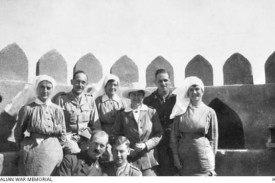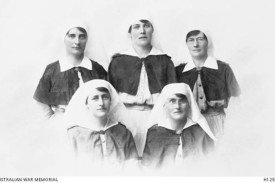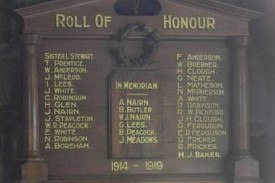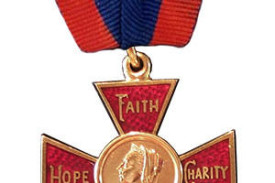General News
12 April, 2025
Veterans' Voices: Lily Stewart
Lily Stewart was born at Ararat in 1889. Her parents were Charles Stewart and Ellen (née Coster) of Ballyorooan, Buangor, Ararat.
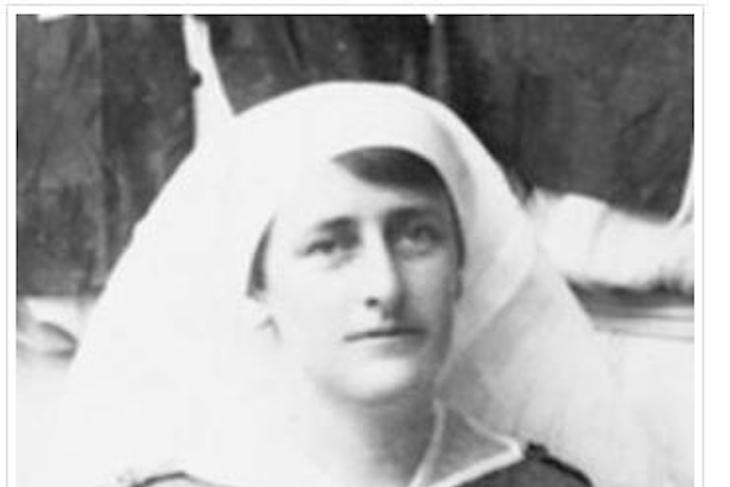
Before enlisting Lily was a nurse trained at the Austin Hospital, Heidelberg in Melbourne, and she also had service at No 5 Australian General Hospital AGH.
Lily enlisted on December 26 1916 and became a staff nurse with the Australian Army Nursing Service.
Her unit was Nurses (July 1915–November 1918).
Lily sailed with her unit from Sydney either aboard HMAT Themistocles on December 29 or Mooltan on December 26 (the day of her enlistment).
She was 27 years of age.
Lily disembarked at Bombay (now Mumbai), India, on January 15 1917.
The same day she was posted to Colaba War Hospital, Bombay, for duty.
She transferred to 44th British General Hospital, Deolali, for duty on May 14 1918.
She was transferred to 42nd British General Hospital Bushire, Persia for duty on May 17.
She also served at Mesopotamia on duty at sea on January 1 1918.
The hospital on the Persian Gulf was the only one near the Mesopotamian front staffed by Australian nurses.
It had about 30 beds for officers and 100 for other ranks.
Most of the troops in the Mesopotamian Expeditionary Force nearby were doing outpost duty on the railway line which ran from Bushire about 100 miles into Persia.
Lily was promoted to sister on December 26 1918.
On May 27 1919 Lily disembarked in Bombay from HT Arondo, having arrived from Bushire, Persia.
She transferred to 19th British General Hospital at Rawalpindi, Bombay, for duty.
On July 20 1919 she was transferred to 53rd British General Hospital, Kuldan, Gharial.
She was later transferred back to Bombay and on September 25 1919 sailed on HMHS Ellora for England.
She was marched out ex India on October 26 to London, where she took a month’s leave.
On returning from leave Lily reported to headquarters.
She departed England to return to Australia aboard HMAT Runic on November 21 1919.
Lily was discharged at 3 Medical District, TPE, on August 11 1920.
Lily received a mention in despatches “for valuable services rendered with the Bushire Force in Persia”.
She was issued the Star of Persia medal and the British General Service Medal with Clasp ‘S Persia’ for her service in Persia.
She also received the Royal Red Cross 2nd Class, the 1914 Star, the British War Medal and the Victory Medal.
Lily did not marry.
She died on September 11 1924 in Kew.
Lily was awarded the
Lily Stewart is honoured on the Buangor Roll of Honour.
‘Mentioned in despatches’
One of the oldest Imperial forms of recognition for bravery or distinguished service for a serviceman or servicewoman was being “mentioned in despatches”.
A despatch is an official report written by a senior commander in the field to pass on information about the progress of military operations.
Commanders would include in their despatches the names of those deserving attention for their services.
Mentions might have been for a specific act of bravery or for a period of outstanding service.
During the Boer War it became common practice to list the names at the end of a despatch.
If someone’s name appeared in one of these lists, they were said to have been “mentioned in despatches”.
The despatches were usually published in The London Gazette so a mention equated to a public commendation.
This and the Victoria Cross were the only forms of recognition for gallantry or distinguished service in action that could be made posthumously.
Before 1919 those mentioned in despatches did not receive any form of recognition other than having their names published in The London Gazette.
In 1919 a certificate was introduced to acknowledge those who received mention.
The following year an emblem of a bronze oak leaf was issued to individuals who had been mentioned in despatches between August 4 1914 and August 10 1920.
The device was worn at a low angle in the centre of the ribbon of the Victory Medal.
Only one device was awarded per person, even if an individual was mentioned more than once.
Royal Red Cross
The Royal Red Cross is a military decoration awarded in the United Kingdom and Commonwealth for exceptional services in military nursing.
It was established on April 27 1883 by Queen Victoria.
The Royal Red Cross has a single class of membership and was first awarded to the founder of modern nursing, Florence Nightingale.
In 1917, a second and lower class, ‘Associate’, was added during World War I.
With thanks: Sally Bertram, RSL Military History Library. Contact Sally at sj.bertram@hotmail.com or call 0409 351 940.
